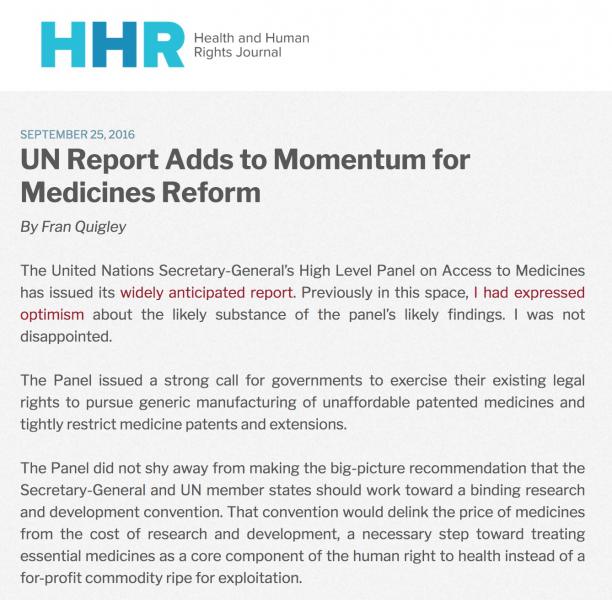
Price-gouging anger about drugs like the EpiPen, plus a promising California ballot initiative, and now a strong UN report on access to medicines. Will it all lead to reform of our broken medicines system? Read more in Health and Human Rights Journal (or below):
The United Nations Secretary-General’s High Level Panel on Access to Medicines has issued its widely anticipated report. Previously in this space, I had expressed optimism about the likely substance of the panel’s likely findings. I was not disappointed.
The Panel issued a strong call for governments to exercise their existing legal rights to pursue generic manufacturing of unaffordable patented medicines and tightly restrict medicine patents and extensions.
The Panel did not shy away from making the big-picture recommendation that the Secretary-General and UN member states should work toward a binding research and development convention. That convention would delink the price of medicines from the cost of research and development, a necessary step toward treating essential medicines as a core component of the human right to health instead of a for-profit commodity ripe for exploitation.
The Report triggered the predictable condemnation from the Pharmaceutical Research and Manufacturers of America (the Panel “fail(s) to recognize and address the complexity of biopharmaceutical research and development”), praise from most access to medicines advocates (Médecins Sans Frontières/Doctors Without Borders called it a “landmark report”) and less enthusiastic endorsement from other advocates (HealthGAP said, “the Panel’s Final Report over-valorizes industry’s voluntary measures and urges countries to adopt flexibilities that partially tame but do not defang monopolies on medicines.”)
But my favorite response to the report came from Dr. Bernard Pécoul, executive director of the Drugs for Neglected Disease Initiative, who issued a well-justified directive. “Governments mustn’t allow the report to become yet another exercise that describes the current failures of the medical innovation system without contributing concrete steps to address those failures,” he said.
Hear, Hear.
As Dr. Pécoul says, this is far from the first report calling for significant medicines reform. Yet we still have an estimated 10 million people dying each year for lack of access to medicines. Even in the United States, one in every four cancer patients does not fill his or her prescriptions due to cost. All of this suffering occurs while pharmaceutical companies earn breathtaking profit margins. Worse, those profits come courtesy of government-provided monopolies on drugs usually discovered with government funding, and then sold back to governments at mark-ups hundreds of times manufacturing costs.
But there is reason to hope that this UN report can contribute to the building momentum for significant medicines reform. Movements underway include the health minister of Colombia’s plans to require a 45% decrease in the Novartis cancer drug Gleevec and Peru, Singapore, New Zealand, and Chile are among the countries who pushed back on Trans-Pacific Partnership Agreement terms that would have restricted access to essential medicines.
Momentum for reform is particularly apparent in the United States. That is key, since it is the US Government that serves as the strong-arm force behind trade agreements that maximize medicine patent protection. (The US State Department issued a statement harshly condemning the UN Panel report as “fundamentally flawed,” due to its failure to adequately embrace intellectual property rights.)
The United States is seeing populist anger over price-gouging such as the 450% increase in the cost of the lifesaving allergy medicine EpiPens and the country’s Medicare program being charged $100,000 per year for a prostate cancer medicine discovered with federal funding. And where there is populist anger, political candidates take notice. Both major party US Presidential candidates vow to reverse the Pharma-pushed ban on Medicare negotiating drug prices, and Hillary Clinton has promised to crack down on drug pricing if she is elected President. “Over the past year, we’ve seen far too many examples of drug companies raising prices excessively for longstanding, life-saving treatments with little or no new innovation or R&D,” she said in early September. “I’m ready to hold drug companies accountable when they try to put profits ahead of patients, instead of back into research and innovation.”
Yet, for access to medicines, the Presidential election may not be the most important US ballot question in November. California voters will be asked to support Proposition 61, the Drug Price Relief Act, which calls for state agencies to be blocked from paying more for a prescription drug than the price paid by the US Department of Veterans Affairs (VA). Unlike the Medicare program, the VA is free to negotiate the price it pays for drugs and as a result it pays as much as 42% less than Medicare and usually significantly less than state Medicaid programs.
In the US Congress and state legislatures, medicines reform proposals are reliably killed off by the influence of the pharmaceutical industry lobbyists that swarm those hallways. The pharmaceutical industry spends more on lobbyists and political campaigns than any other industry does, and it has proven to be money well-spent (for the industry). But the California measure bypasses the lobbyists and puts the vote directly to the people. Which is clearly making the industry nervous. A referendum opposition campaign, “Californians Against the Misleading Rx Measure” has reported nearly $70 million in donations, almost all from pharmaceutical companies.
That kind of money is available to spend when you run a company that can charge any monopoly price it wishes for a life-or-death product. And it is apparently money worth spending to defend a gold-plated business model. An industry newsletter says that adoption of VA pricing by the State of California would be “a pricing disaster for the entire US drug industry.”
The billions who struggle to pay for the medicines they need every day know what a true disaster feels like. Here’s hoping that the upcoming US elections, the UN panel’s new report, and all the advocacy across the globe can move us down the path towards medicine access being a fully realized human right.
